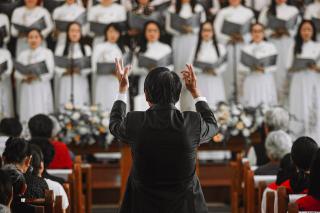Yearning In Person
Part of Multi-Platform Resources

As local infection rates trend downward, and people start including the word “endemic” in conversations, the yearning to get “back to normal” becomes stronger.
Many of our people hope to be back in the sanctuary with live music, the blending of voices during the hymns, and our friends surrounding us. One whole community. This hope reminds us that in person worship is vital and life-giving.
Sometimes this hope is woven with grief, wishing the experience was as it used to be, with no distracting cameras or screens or chat window to remind us of this pandemic.
Sometimes there may be blame or anger at people still at home who must be “wrong” for the conclusions they’ve reached about their own personal risk. Some think: If only they could come in person, we could all be together again.
As religious leaders, part of our work is to help our communities hold the tensions and contradictions between different experiences and different needs. We knew at the beginning of the pandemic that our ability to quickly pivot to online worship was a blessing for our whole communities.
For some it was a bittersweet blessing. People with chronic illnesses and/or disabilities were told that remote worship was “too hard,” only to find out that when able bodied people needed remote worship, it wasn’t too hard.
This is a time to stay centered in the values of inclusion, consent, going slow and being flexible.
This is also a good time to review Rev. Sunshine Jeremiah Wolfe’s video on how the trauma of the COVID-19 pandemic impacts people as we return to more in person ministry. They explain the ways people will want to return to the old normal and that, paradoxically—as we re-gather—people will experience even more unraveling.
It’s important to remember how online ministry has been a blessing for many in our faith communities. Just as in-person worship is vital and life-giving for some, for others online and multi-platform worship provide a lifeline.
Even though many of us have a much lower risk from COVID-19, we are called to remember that some of us are still very much at risk. It is a time to continue to lean into all we’ve learned as we strive to build radically inclusive communities.